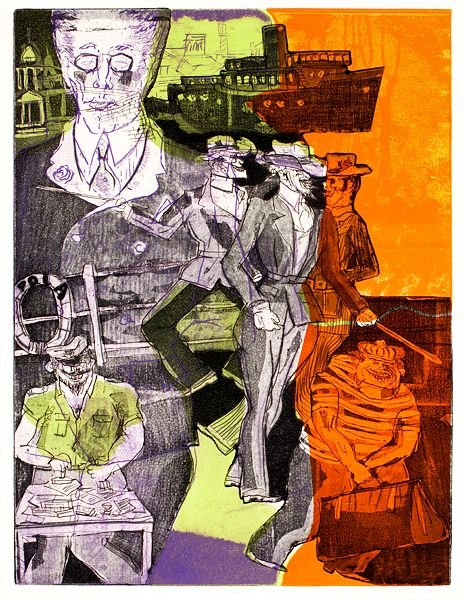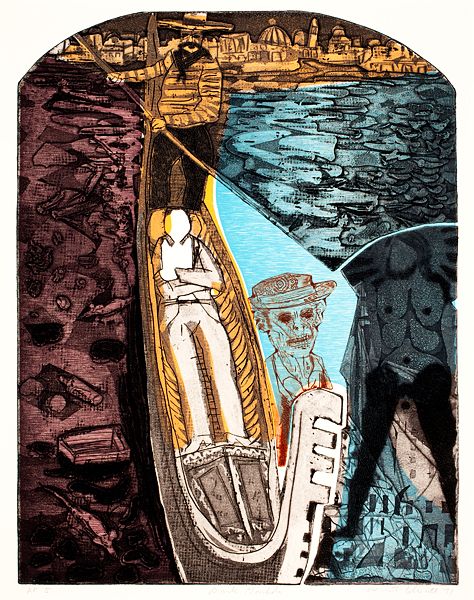"Death in Venice" by Thomas Mann, one of my favorite books for all time!
In Thomas Mann's novel "Death in Venice," the main character Gustav von Achenbach was originally seen as a man with an industrious and hard-working character. Over the years his experiences have gone on, as do most of the bourgeois people. With the continuation of history, the reader learns more and more about Achenbach and his life and personality, his passions, and his creative nature, is becoming more and more revealed, under the layer of bourgeois habits. Achenbach's persistence and diligence in his professional activities has led to his success and respect for the world he has always sought. Achenbach remains estranged from the world in his youth years, and has a hermitage way of life. Thomas Mann depicts him as a closed artist, separate from reality, and completely devoted to the sense of moral duty to bring truth to mankind through his writing. Throughout history, Man shows the destructive result of the artist's enthusiasm, driven by his newly discovered attraction to tangible beauty as opposed to the beauty of the written word.

The name Gustav Ashenbach is a combination of two artists from the time of Thomas Mann. Gustav Mahler is a composer who died on 18 May 1911, at a time when Mann was on vacation in Venice. And the name Achenbach comes from the artist Andreas Achenbach, who is painting landscapes in which the booming sea dominates as a theme. His Achenbach family is translated as "ash creek" and is both a reference to death and canals in Venice. In Death in Venice, Mann criticizes the bourgeois way of life. Achenbach is the son of a devoted servant and is extremely disciplined in all aspects of his life. He was born a girl, but not a son. This lack may have played an important role in his enthusiasm for Tadzios. Throughout the novel, we can see a clear reference to Nietzsche's "Birth of Tragedy" and his views on the Dionysian and Apollo beginnings. The first part of the work, before Achenbach to travel to Venice shows his Apollo home and how his entire life is strict and with self-discipline, his dedication to his spirit and his deep sense of mission in this world, a pedagogue and a moral navigator of the youth. This extreme of its existence reverses radically after meeting with the stranger and deepens more and more when he is obsessed with Tadzio. At Achenbach's first view of Tadzio, the beauty of the young man awakens in him the admiration and the calm overlay of impressions. Then, when Tadzio comes out of the seas for the first time, the last one, which is completely similar to him, will have a fatal end, he begins to discredit Achenbach and his dedication to the sphere of speech. Sensitivity slowly begins to take control and swallow it.
The novel follows a longing for the unknown and the irrational, which has anti-social nature. The craving wakes up after a look at a stranger near the cemetery in Berlin and reaches its end with the boy's eye, in which Achenbach falls in love with the perfect beauty. How is something as frail as a look to turn a man into all his ideas that he has built all his life, to give up on them and to give him complete self-denial. "Observation is now becoming an object of art, not so much in a means of its reception," says Batai.

Human history gives us many examples of the serious consequences to which one can look. For example, with Lot's wife, who does not obey the command of God, and turns to see the destruction of Sodom and Gomorrah. This disobedience transforms her into a pillar of salt. Another example is the turning of Orpheus to see his Eurydice, the reason for which he irrevocably loses it. People do not see what they can’t see. A gaze that the Romans demanded to be a side-of-arms is associated with a fatal look. Fatal look, as Pascal Quignard says, is the look of fatum. Fatal gaze doesn’t lead to consciousness. It leads to the inviolability of the incident, driving the catastrophic connection of fate / initial intercourse /. He gathers the cruelty of the moments that follow and merge to the belief in conquering the meaning that is not dominated. This is like the unpredictable moment in which, however, the anticipated power pulls us off. In the final stage of the beach, there are two photographic apparatuses, which are barrelless and with a black cloth that is poured on it. I suppose this is a lifeless view from a distance that covers Achenbach and Tadzio's eyes and closes them in a common symbiosis. I think he serves as a symbol that captures the unseen moment of the connection between death and the new life, the unrequited love that takes place in the afterlife, but it also remains unconfirmed and secret to the outside world. This is a distant view that covers Achenbach and Tadzio's looks and closes them in a common symbiosis.According to Batai, the dying man derives even greater bliss from his death, and in the mind of his destruction he has reached the crown of a life justified only by the need to break down. Thus, in the universe, the obliterant is both a final denial of everything else and, along with it, its own lack of protection from this denial. While the denial power lasts, it gives some privilege.

Erotic and death in the novel are symbiotically related. Eroticism is a subversive irrational force, which is an act of overcoming itself. Eroticism violates norms and order, and has great similarities to plague and anarchy that occurs when the epidemic grows. Both reach a strong exaltation in which the rational goal loses its meaning. Both of them cause chaos. The fright Thomas Mann regards it not as a physical illness, but as a disease of the spirit. It kills without destroying organs, and Achenbach's attraction, without possessions, causes the most lasting changes in his spirit. His illegitimate longing completely overlaps with the plagues of the plague. Like his dreams when he is between sleep and wakefulness, and meditating on transcendental and metaphysical things, the Dionysian time when the conquest is being destroyed, as well as the hostility of both to the social and their potential rebellion. In my view, this terrible longing is also the reason for the protagonist to call to his aid the cultural age of ancient Greece to serve him as a justification and to give him the means of aiding the sensuousness that he and all Western thought has overlooked for such a long period time. In ancient Greece, the body is worshiped, as with the advent of Christianity it is demonized. The contemplation of beauty brings Achenbach to creative inspiration, achieves his ultimate goal, yet he is no longer content with what he has created.
This novel was interesting to me on a personal level. I’m not a very social person, and often, forming an attachment to (and imagining a connection with) a familiar stranger meets my social needs. I haven’t taken it to the extent that Aschenbach does, but it does tend to happen! So I’m interested in his motivations. In my case, I think I’m probably trying to fill a need without the commitment or work a real relationship would require (so tiring, seriously, go away), but Aschenbach is addressing a different need. I think the boy represents youth and is beautiful and lovely, in contrast to the old guy chilling with the younger people we see earlier, who repels Aschenbach. He’s a bit sickly and won’t live very long (I mean, it doesn’t), and he’s aware of Aschenbach, but not aware of him… he doesn’t know him, but he’s friendly without understanding the older man’s interest.I can’t figure out what the red-haired man and the performer are meant to be. @godflesh
Thank you for the comment, @cyberwarrior :)
With me is the same. I love this novel because I am not social :D
Have you read his other novels? They are really good too as "Tonio Kröger" , "Tristan" and my favorite "The Clown". I love them because they show misunderstood and alone person's. If you know some other writers who describes this kind of life I will love to hear about them.
The red-haired man is symbolizes the Dionysian beginning. Try to read Nietzsche's "The Birth of Tragedy", there is very clear show what it means. :)
I trust you’ve read Hesse, of course?
Of course.... :) I think everything I have read from him. He have a very strong influence on me :)
Not surprised to hear it ;) He was a major influence for me, as well!
Thank you for the info about red-haired man however the concept is clear in my mind now. and No i did not read his other novels but i'm looking forward to read The Clown thank you for your suggestions. I'm not getting time to read stuff because of busy schedule but whenever i found interesting book i'll let you know :) till then read "Fiorenza" by Thoman Mann i heard this one is also good book :)
Good day :)
I will search for it , thanks :)
Have a nice day too :)
Of course, it’s also one of my favorites, too, only I take it to be an extended meditation on desire — and how if the body rules the mind, one’s world might unravel.
Serious question, @godflesh, given how similar our concerns/readings are, why is it you have not visited my blog — not even once?
Sorry for that @yahialababidi, now I see that I have not followed you and your article never appear on my first page. I fix that problem :)
Many thanks & welcome on board 🤓
I hope you enjoy my blog as much as I do yours ✌🏼
Good work .very nice post
Thank you :)
Very nice story..good luck @godflesh.
Thanks! Cheers! :)
sometimes the more intelligent human beings forget to the creator, should be in barengi with strong faith
sometimes yes :)
Yes yes god
:)
You got a 5.73% upvote from @postpromoter courtesy of @godflesh!
Want to promote your posts too? Check out the Steem Bot Tracker website for more info. If you would like to support the development of @postpromoter and the bot tracker please vote for @yabapmatt for witness!
Thank you :)
I had to read it in shool. I remember was this one mysterious men who always appeared.